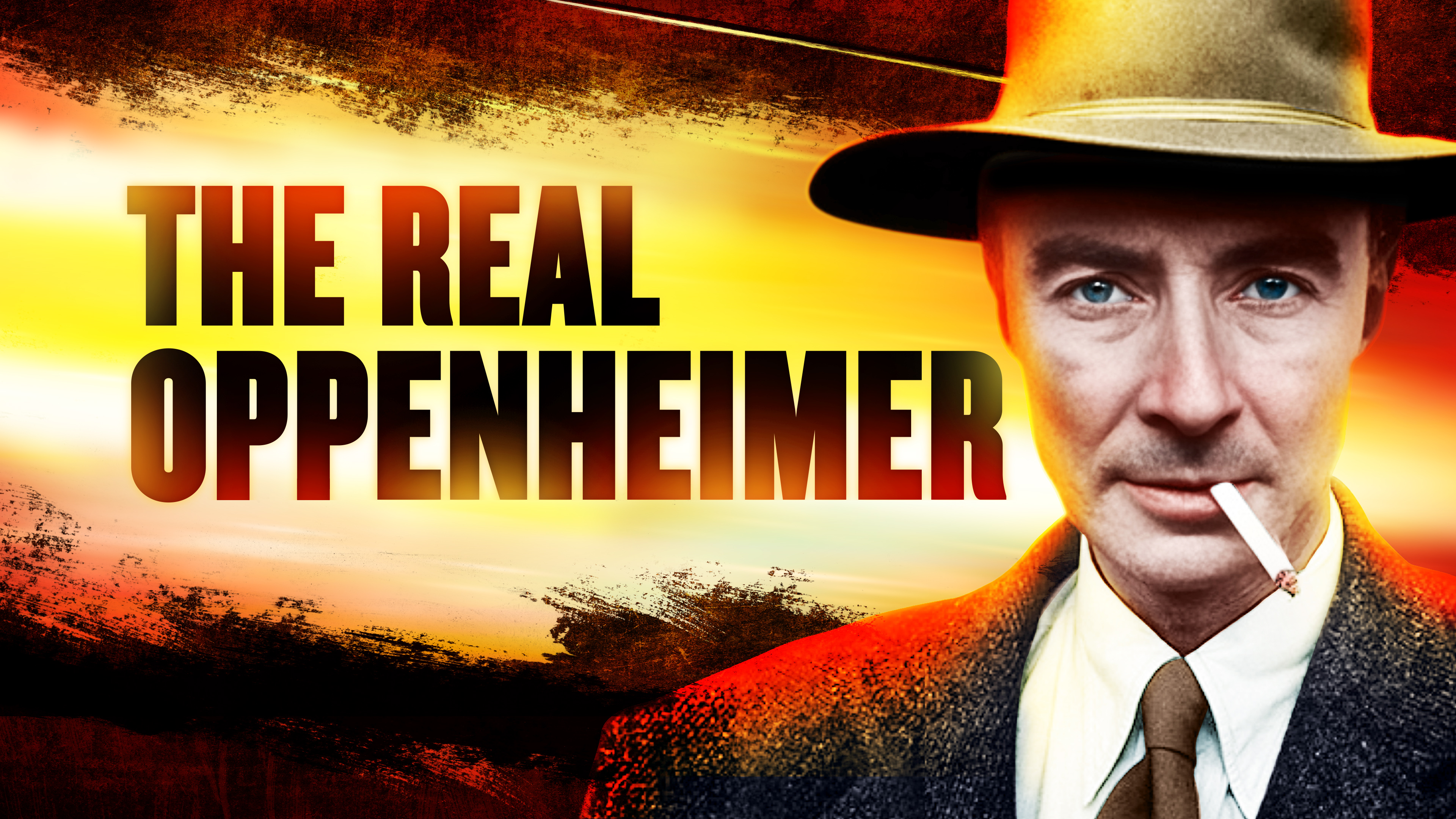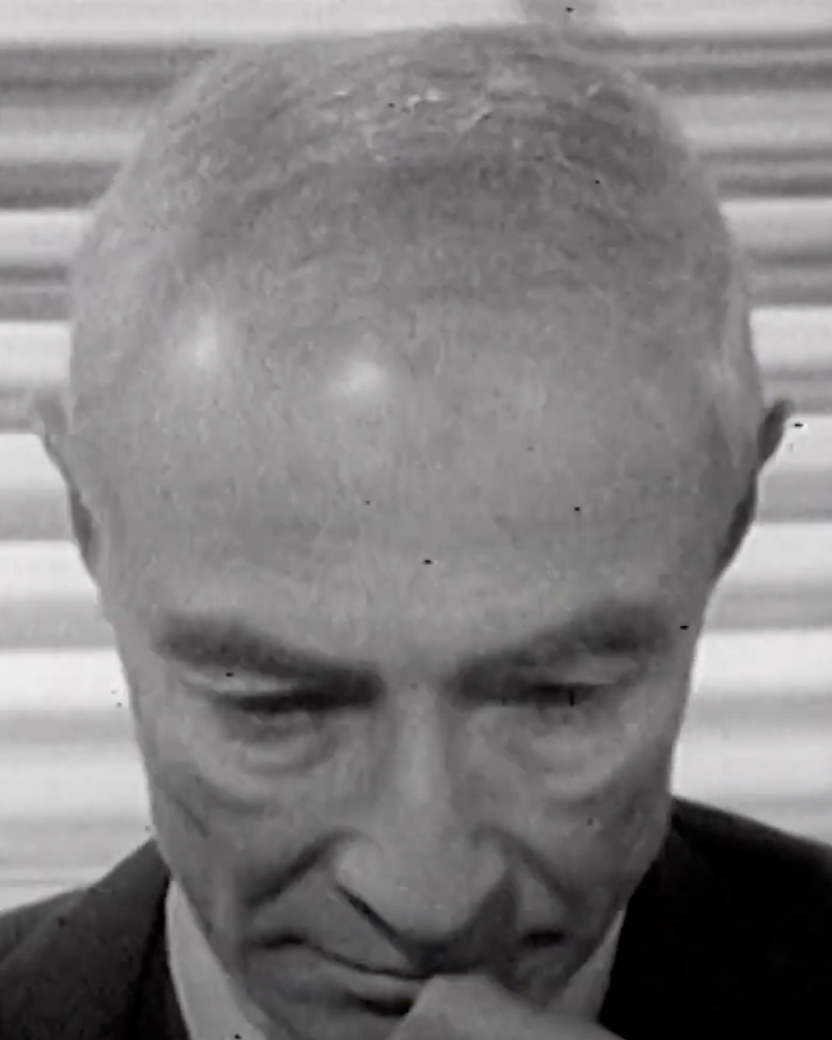What happens when one’s monumental scientific achievement changes history but also destroys two cities?
◊
Robert Oppenheimer, the brilliant physicist who orchestrated the development of the first nuclear bomb, was conflicted over the Manhattan Project’s extraordinary achievement. Before the bomb was tested in 1945, scientists didn’t know if the explosion would burn up the entire atmosphere, thereby annihilating all life on Earth. Clearly, the stakes were high for all of humanity. These are some of the crises explored in The Real Oppenheimer, one of MagellanTV’s new releases for August.
Using archival photos, newsreel clips, and unobtrusive original scenes, The Real Oppenheimer deftly sketches out the chronology of Oppenheimer’s early years before segueing to the geopolitical context for World War II, the Manhattan Project, and the early Cold War, all of which it handles with equal efficiency and clarity. Coming in at just over 44 minutes, this documentary is an excellent snapshot of one of the most important figures in the first half of the 20th century.
Historian and author Guy Walters, along with historical biographer Alex Larmer, offers summative and explanatory commentary on events, clearly and concisely leading the viewer through the complex history of events before, during, and after World War II. That approach makes grasping the scope of the period and the profound effects of the Manhattan Project more manageable. It certainly helped me contemplate the context within which Oppenheimer thought about his work.

The Real Oppenheimer will debut on August 15.
We learn that Oppenheimer’s childhood education at a secular humanist school was grounded in ethics. Then, as a Harvard undergraduate, Oppenheimer studied chemistry and took graduate-level physics courses. By age 23, he had his doctorate in physics. When Hitler invaded Poland in 1939, Oppenheimer was already established as a formidable physicist.
In 1942, President Franklin Delano Roosevelt approved the creation of the Manhattan Project, which brought together scientists, engineers, and other experts to fulfill myriad roles, including procuring the materials in the quest to create an atomic bomb and determining other countries’ nuclear capabilities. General Wesley Groves, the project’s commander, selected Oppenheimer as its mastermind.
 Robert Oppenheimer, after World War II
Robert Oppenheimer, after World War II
The documentary highlights some of the ways in which Oppenheimer’s ambivalence to the program’s stunning scientific success was fueled by his ideas, beliefs, and attitudes from his personal life. Among these were his attitude toward relationships, which reflected a bohemian artist’s free spirit more than social norms of the day. In addition, his intellectual and political commitments included longtime study of the Bhagavad Gita and leftist ideology.
I found the documentary compelling in the way it weaves influences on Oppenheimer’s thinking into the events leading up to, including, and following WWII. Examples include direct experience with antisemitism during his graduate studies in Germany during Hitler’s rise to power, and his leftist political leanings. Oppenheimer also became a vocal advocate of arms control, married a member of the Communist party, and eventually bequeathed the considerable wealth he inherited from his parents to universities and social causes.
On August 6, 1945, the Enola Gay dropped Little Boy on Hiroshima, instantly killing 80,000 people and leading to the deaths of tens of thousands more. Three days later, another 60,000 people died when Nagasaki was virtually erased by a second atomic bomb, which was dubbed Fat Man. Those deaths, along with survivors who lived through it to endure immense suffering, made real what had heretofore only been a test. “Now I am become death,” Oppenheimer famously said after the Trinity Test in New Mexico, quoting the god Vishnu from the Bhagavad Gita, “the destroyer of worlds.”
Ω
Mia Wood is a philosophy professor at Pierce College in Woodland Hills, California. She is also a MagellanTV staff writer interested in the intersection of philosophy and everything else. Among her relevant publications are essays in Mr. Robot and Philosophy: Beyond Good and Evil Corp (Open Court, 2017), Westworld and Philosophy: Mind Equals Blown (Open Court, 2018), Dave Chappelle and Philosophy: When Keeping it Wrong Gets Real (Open Court, 2021), and Indiana Jones and Philosophy: Why Did It Have to be Socrates? (Wiley-Blackwell, 2023).
Title image: The aftermath of Little Boy, the atomic bomb dropped on Hiroshima, Japan, in August 1945
.jpg)
.jpg)